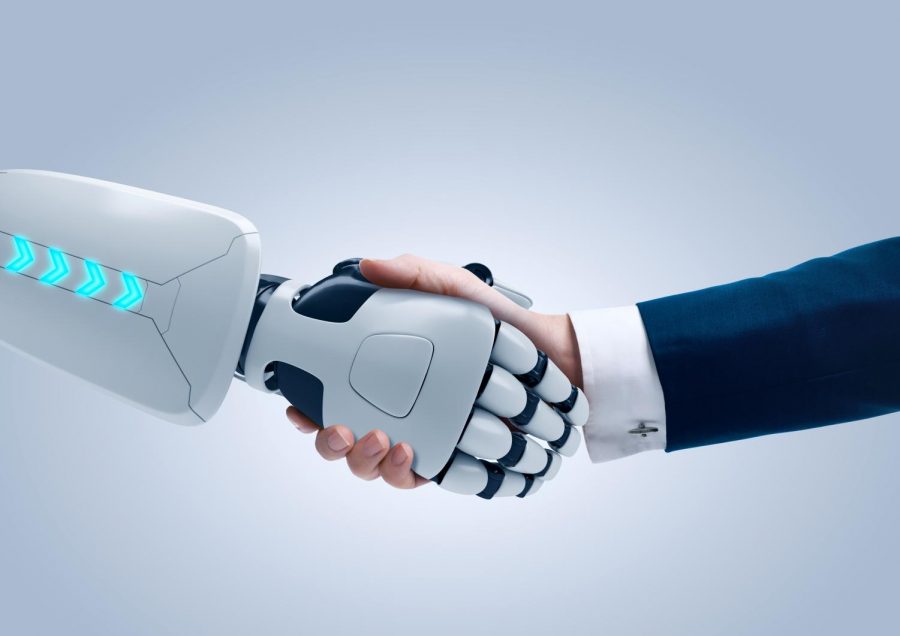Robots are coming—but to help, not take over
National Robotics Week, April 8–15, takes robotic inventions and discussions on the future of robots all over the country, including Chicago. McCormick Place will host the Automate conference April 3–6 and the Museum of Science and Industry will host robotic-themed events April 8–9 and 14–15.
April 3, 2017
The robot revolution is on its way, bringing more friends and tools for WALL-E, C-3PO and HAL 9000.
National Robotics Week, April 8–15, will celebrate new advances in automation and emerging STEM careers as well as expanding the public perception of robotics. The Museum of Science and Industry is presenting four robotic-themed programs April 8–9 and 14–15, featuring interactive robots for children, work from local universities and talks from experts in the field.
Kathleen McCarthy, director of collections at MSI, traveled to Japan to view its innovative robotic technology and wants to replicate the “amazing experience” for Chicagoans through the events, as well as the upcoming “Robotic Revolution” exhibit coming May 11.
“Guests will walk away with a broader understanding of what a robot is and how they can learn the basic parts to dream of their own,” McCarthy said.
National Robotics Week and automation reliance also raise questions of how the future of robotics will impact employment. Howie Choset, professor of Robotics at Carnegie Mellon University and chief technology officer at the newly organized Advanced Robots Manufacturing Institute, said robots working with humans is a key aspect of automation—one he is still trying to wrap his head around—that has been shown to create more, better quality jobs, not diminish them.
“Time has shown over and over again that wherever there is innovation and automation, more jobs are created,” he said.
He said collaborative robots—robots that work in tandem with employees to increase efficiency—are a rising trend in the manufacturing industry. They act as supporters for people working in STEM careers, he said, adding that every manufacturing worker he has met embraces the aid of robots, instead of looking to them as the cause of job loss.
“[Companies] realize if they don’t embrace automation, they are not going to be cost-effective with other [companies] in the world,” Choset said. “To them it’s a means of survival. Do the robots put you out of a job? It’s more like the robots are saving the jobs.”
Robots are in the middle of overhauling every major technological company and career field. From tech companies such as Apple, Google and Amazon to the medical field, automation has become the norm, Choset said.
Looking at the medical field’s acceptance of automation, he said microrobotic surgical systems that help surgeons operate inside the body for less invasive procedures are changing medical accessibility and jobs. With these new tools, Choset said nonsurgeons can carry out surgical procedures, which help standardize surgery and make it more affordable to low-income families.
“When you increase productivity, maybe on a concentrated scale there is some loss, but overall, there is a gain,” Choset said.
Bob Doyle sees this hike as a growth to companies. Doyle, the director of communications for the Robotic Industries Association, Advancing Vision + Imaging and the Motion Control & Motor Association, said robotic tools not only create more jobs but safer ones. Doyle noted that robot sales continue to increase since the great recession and the unemployment rate continue to fall.
“[Robots] allow a company to create higher tech, fast, better quality, higher-paying jobs,” Doyle said. This lets the company hire more people and reserve dangerous, more grueling work for the robots, he added.
Doyle said the biggest challenge of the future of automation is finding qualified people to fill the jobs to advance manufacturing and making sure proper technology is present to keep these robots functioning properly.
Another is demystifying the perception that robots are going to take over the world—largely a stereotype from Hollywood movies—and leave people unemployed, he said.
For National Robotics Week, AIA and A3 are hosting Automate, the robotics convention at McCormick Place, 2301 S King Drive, April 3–6. The conference will host panels with experts in the field, showcases of new robotic inventions and allow people to interact with them. Doyle said this is yet another way to debunk perspectives of automation.
Like any new invention, robots have drawbacks, Choset said. For robots, he said misuse of automation is an issue to be dealt with. The way to combat it is through education, interviews and conferences like Robotics Week and Automate, he said.
“The truth is, robots are coming, and we are going to embrace them,” Choset said.








